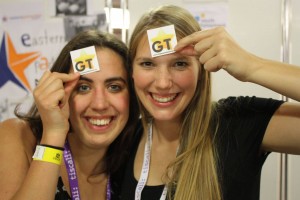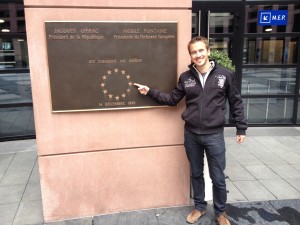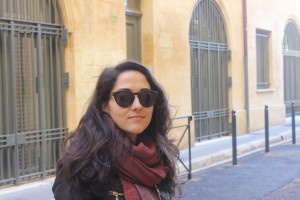The external work of our association is as important as the internal one. Since the number of international organisation is very high, AEGEE-Europe has appointed some members, called Liaison Officers to maintain a link between AEGEE and the international organisations they work with. Currently AEGEE has six Liaison Officers, namely Diego Antončić, Liaison Officer towards the Committee of the Regions (CoR) and the European Economic and Social Committee (EESC); Marije Arentze, Liaison Officer towards the OSCE (Organisation for Security and Co-operation in Europe); Burcu Unluturk, Liaison Officer towards the Organisation for Economic Co-operation and Development (OECD); Alba Laguna, Liaison Officer towards the United Nations’ Environment Programme (UNEP); Adela-Mihaela Militaru, Liaison Officer towards The United Nations Educational, Scientific and Cultural Organisation (UNESCO) and Paul Smits, Liaison Officer towards European Youth Forum (YFJ). We asked some questions to Marije, Burcu and Diego to better understand their work.
Please, describe yourself.
Diego: My name is Diego Antončić and I have been a member of the AEGEE family since December 2013. I am 22 years old and I am studying European Studies at the Faculty of Social Sciences in Ljubljana. As a member of AEGEE I participated in numerous events and conferences organised by our organisation. I am very communicative and I can easily adjust to new situations. I love to travel and to learn about different cultures. Besides that, I love reading and I enjoy sports.

Marije Arentze, Liaison Officer towards the OSCE (Organisation for Security and Co-operation in Europe)
Marije: My name is Marije Arentze and I have been a member of AEGEE-Leiden for six years. I am studying Eastern-European studies in Amsterdam, with a main focus on transitional societies in former Yugoslavia. My number one hobby is travelling and I also love music and literature. My AEGEE history includes a few very active years within AEGEE-Leiden and my work as Content Manager for European Boards’ Meeting (EBM) Lublin 2014. At this moment I spend the major part of my free time with AEGEE Election Observation, the project I am part of for over a year and a half now, and where I fulfill the position of External Relations manager. It gives me a great deal of inspiration every day!
Burcu: I am Burcu Ünlütürk from AEGEE-Ankara, currently trying to survive living around -30 degrees in northern Sweden where I am doing my masters degree in mining engineering and working on sustainable use of natural resources.
Which is the international organisation you are responsible for? And what is its main purpose?
Diego: I am a Liaison Officer towards the Committee of the Regions (CoR) and the European Economic and Social Committee (EESC) in the EU. This is my second mandate as the Liaison Officer towards the CoR and my first mandate towards EESC. The CoR is the European Union’s Assembly of Regional and Local Representatives, which gathers 350 members from 28 member states of the EU. The CoR is an advisory body of the EU and it must be consulted by the European Commission, the European Parliament and the Council of the EU throughout the EU decision-making process on the issues that are relevant for cities and regions. The CoR members prepare and present opinions about the new European legislative proposals. One of the main functions of the CoR is to represent interest of regions and cities in the EU and to support better communication between them. In order to promote better cooperation on regional and local level, the CoR hosts numerous conferences, events and workshops, which are organised by local and regional associations. The EESC is a consultative body of the European Union that gives representatives of European civil society and economic interest groups a formal platform to express their opinions on the current EU issues. Like the CoR, the EESC can issue an opinion regarding a certain topic and it needs to be consulted by central EU institutions. The committee’s main goal is to strengthen the democratic legitimacy and effectiveness of the European Union by enabling and encouraging participation of civil organisations from the Member States in the processes taking place at the European level.
Marije: I am the Liaision Officer towards the OSCE, the Organisation for Security and Cooperation in Europe. It is the world’s largest intergovernmental organisation with a mandate to secure arms control, human rights, fair and free elections, and other issues that are central to free and democratic states. It was founded during the Cold War and is mainly occupied with conflict prevention and post-conflict rehabilitation in its member states. As part of this they have permanent offices or missions in Ukraine, Kosovo, Tajikistan and Armenia to name just a few. The OSCE Chairmanship changes every six months to a new member state, just like the chairmanship of the European Union. As of January 2016, the presidency is occupied by Germany. Our main focus lies with OSCE’s sub-division ODIHR (Office for Democratic Institutions and Human Rights), which works on the so-called “human dimension” of security; free elections and democratization, minority issues, hate speech prevention, etc. 40% of ODIHR’s annual budget goes to the Elections department, which organises Election Observation Missions and which is seen as the “golden standard” for election observation methodology in the world.
Burcu: I am the Liaison Officer towards the Organisation for Economic Cooperation And Development (OECD). Its mission is to promote policies which will improve the economic and social well-being of people around the world.
Why did you apply to cover such a position?

Diego Antončić, Liaison Officer towards the Committee of the Regions (CoR) and the European Economic and Social Committee (EESC).
Diego: My academic experiences and different events, in which the topics regarding the European Union and AEGEE were discussed, shaped my ideals and my main interests, which I want to realize in my personal career. As a student of European studies and an AEGEE member, I am a great supporter of the processes, which are taking part in the united Europe and I am very motivated to give my contribution to the improvement of our multicultural continent. I applied to cover such a position, since I wanted to make a contribution to the functioning of our AEGEE community and since I was quite familiar with the structure of the CoR and the EESC. I am honored to be the Liaison Officer towards the CoR and the EESC and I am proud to be a part of our beautiful AEGEE story.
Marije: My first thought was that it would make a lot of sense for me to succeed Julia Krebs as Liaison Officer because of my position as External Relations of AEGEE Election Observation. Our project has generated quite some interest within the OSCE over the past two years, so it would be mutually beneficial for both AEGEE-Europe and AEGEE Election Observation to combine these two images towards the OSCE. Next to that I realised that an inside look into the OSCE would be complementary to my academic field of interest, namely post-conflict societies.
Burcu: I have experience in representing the organisation, creating positive public image and establishing cooperation with possible partners. Also, since my current academic work requires me to do research on OECD’s reports, I am acquainted with the work of OECD and want to learn more, which , in my opinion, will enable me to widen the communication bridge between the organisaton and AEGEE. I am strongly motivated to work as Liaison Officer and contribute as much as I can to AEGEE.
What are your main tasks?
Diego: I represent a link between AEGEE and the CoR and the EESC and I inform the Comité Directeur and the whole Network about new opportunities and events offered by these two committees. I endeavor to involve our AEGEE members in different happenings of the CoR and the EESC in order to encourage political participation. I exhaustively analyzed the CoR’s and the EESC’s goals, policies, tasks, structure and activities, which helped me to gain deep understanding of their role and their importance for the EU. Occasionally, I follow (plenary) sessions of the committees to stay informed about the latest happenings. In addition, I am continuously up-to-date with all CoR’s news and events and I subscribed to the CoR’s newsletter.

Burcu Ünlütürk, Liaison Officer towards the Organisation for Economic Co-operation and Development (OECD)
Marije: According to the CIA (AEGEE-Europe’s legal framework) it is my task to “maintain a constant flow of communication” between AEGEE-Europe and the OSCE and to represent AEGEE-Europe towards the organisation. In practice, it is my ambition to raise interest within AEGEE-Europe for this organisation, as I see it becoming more and more relevant in European geopolitics in the coming years. AEGEE could benefit much more from the OSCE, and especially ODIHR, because they are working on a lot of issues we are dealing with as well. I am seeking ways to connect certain thematic “bodies” of AEGEE-Europe (in absence of a better word) to relevant ODIHR departments. For AEGEE Election Observation’s project team meeting, I visited ODIHR’s office in Warsaw in January, and I hope that AEGEE as a whole can benefit from the good relations we made there with ODIHR.
Burcu: LOs main tasks are to build, to continue and to ensure the relationship with the organisations and to manage the communication between them. I am the person who is responsible with Comite Directeur to secure this relation while figuring out where AEGEEs priorities and initiatives overlap with OECD and where close cooperation can be established.
Written by Erika Bettin, AEGEE-Verona

